| Srl | Item |
| 1 |
ID:
152641
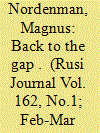

|
|
|
|
|
| Summary/Abstract |
A resurgent Russian navy is increasingly active in the North Atlantic and around the Greenland–Iceland–UK gap. Magnus Nordenman argues that an effective response will require investments in high-end maritime capabilities, along with deeper cooperation among the US, the UK, Norway and others.
|
|
|
|
|
|
|
|
|
|
|
|
|
|
|
|
| 2 |
ID:
152639
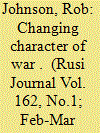

|
|
|
|
|
| Summary/Abstract |
Several fashionable fallacies affect current assessments of the character of conflict. It is always difficult to discern what changes will affect the strategic level, especially when attention is focused on particular wars and technological novelties. In this article, Rob Johnson argues that an honest appraisal of what is unchanging offers one route to that evaluation. Strategically, revisionist geopolitics, an electronic arms race between encryption and access, and a greater focus on protecting populations and national wealth are anticipated. After a period when the West could intervene across the globe at will, it appears that escalatory, existential threats are back, demanding a strategic solution.
|
|
|
|
|
|
|
|
|
|
|
|
|
|
|
|
| 3 |
ID:
152644


|
|
|
|
|
| Summary/Abstract |
In this article, Robert Seely offers a comprehensive assessment of what has become known as Russian ‘hybrid’ warfare. First, he asks whether ‘hybrid’ is the most appropriate term to use when studying contemporary Russian warfare. Second, he introduces a method of categorisation to help make sense of the considerable diversity of Russian tools of war. Finally, he suggests that contemporary Russian warfare is more than just war; it amounts to a reinvention of strategic art, where the tools of state power are integrated into a single whole.
|
|
|
|
|
|
|
|
|
|
|
|
|
|
|
|
| 4 |
ID:
152640
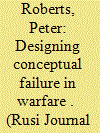

|
|
|
|
|
| Summary/Abstract |
In this examination of modern warfare doctrine and strategies, Peter Roberts argues that Western militaries are constrained by thirteenth-century theological philosophy and Napoleonic dogma, while their enemies have leapt ahead into the twenty-first century – not simply in technological terms, but in the very way they have reimagined warfare.
|
|
|
|
|
|
|
|
|
|
|
|
|
|
|
|
| 5 |
ID:
152646
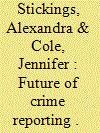

|
|
|
|
|
| Summary/Abstract |
Digital communication leaves traces that can lead back to the person who initiated the communication or their location at the time. Jennifer Cole and Alexandra Stickings explore the challenges this brings for platforms that claim to offer anonymous crime reporting, and ask what can be done to assure members of the public that their identity can still be protected.
|
|
|
|
|
|
|
|
|
|
|
|
|
|
|
|
| 6 |
ID:
152642
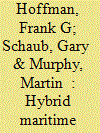

|
|
|
|
|
| Summary/Abstract |
Russia’s use of hybrid warfare techniques has raised concerns about the security of the Baltic States. Gary Schaub, Jr, Martin Murphy and Frank G Hoffman recommend a series of measures to augment NATO’s Readiness Action Plan in the Baltic region, including increasing the breadth and depth of naval exercises, and improving maritime domain awareness through cooperative programmes. They also suggest unilateral and cooperative measures to develop a sound strategic communications strategy to counter Moscow’s information operations, reduce dependence on Russian energy supplies and build the resilience of critical undersea and maritime infrastructure. Finally, the article proposes that more attention be devoted to resolving unsettled maritime boundaries between Latvia and Lithuania, and between Denmark and Poland, to reduce the chance that these can be exploited to increase regional instability as part of a larger hybrid campaign.
|
|
|
|
|
|
|
|
|
|
|
|
|
|
|
|
| 7 |
ID:
152643


|
|
|
|
|
| Summary/Abstract |
During the last decade, ‘hybrid warfare’ has become a much used yet controversial term in professional military and political discussions. Since the beginning of the Ukraine crisis in 2014 its Russian counterpart, gibridnaya voyna, has also become very popular in professional military and academic discourse in Russia. Ofer Fridman explores Russian conceptual and theoretical publications and political analyses, showing that the only common ground between the two terms is the name. A grasp of the essential conceptual differences is vital in understanding contemporary political-security discourses in the post-Soviet region.
|
|
|
|
|
|
|
|
|
|
|
|
|
|
|
|
| 8 |
ID:
152645
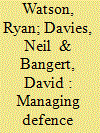

|
|
|
|
|
| Summary/Abstract |
This article reviews the previous literature on the cost escalation of defence equipment and provides estimates for Royal Navy platforms over the past 55 years. David Bangert, Neil Davies and Ryan Watson examine the experience of other European states and previous unsuccessful attempts to address the problem in the UK and other European countries. They conclude that while the problem cannot be ignored, solutions will be painful.
|
|
|
|
|
|
|
|
|
|
|
|
|
|
|
|